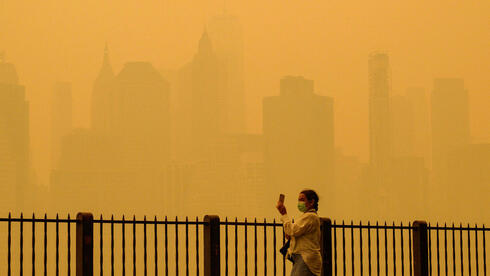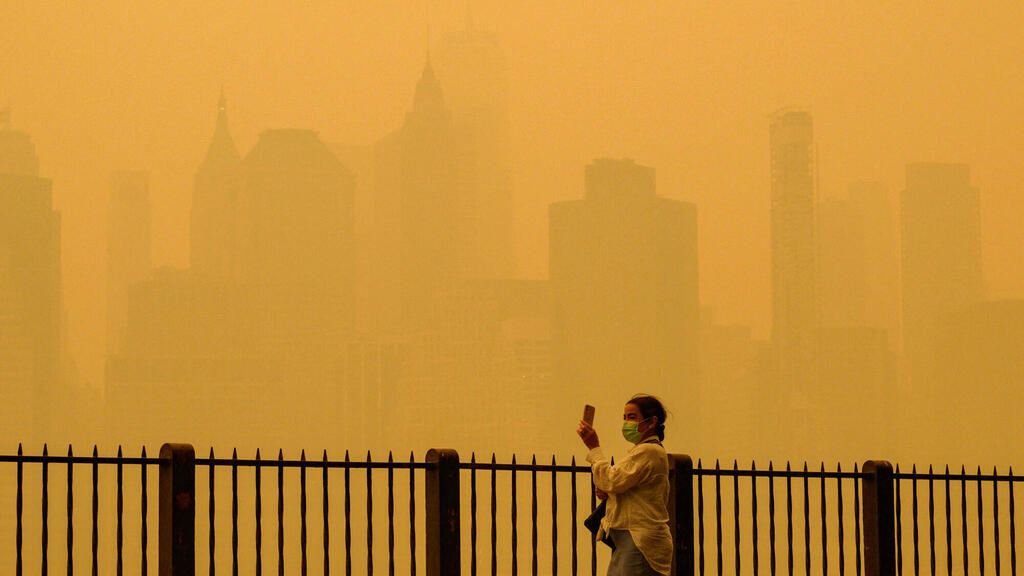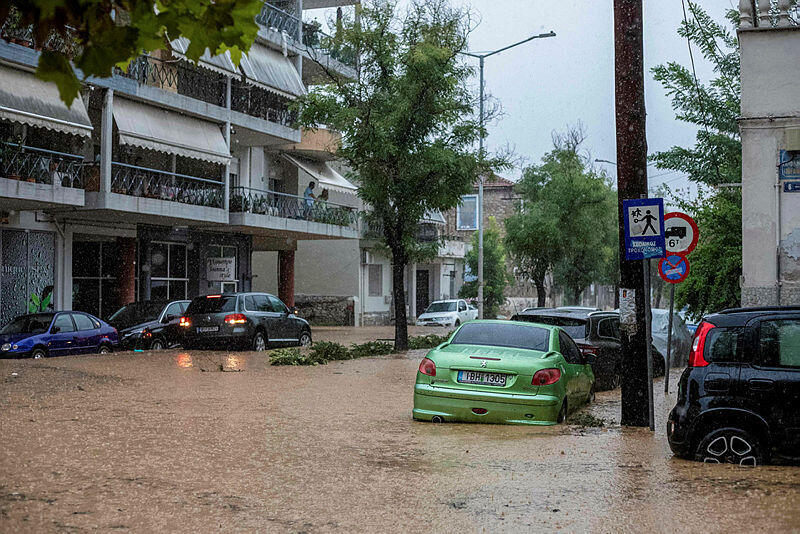
2023 was disastrous for the world's climate, but '24 could be worse
From terrible fires in Canada to deadly floods in Greece to scorching temperatures that have not been seen since records have been kept, last year left a particularly bad climate imprint on the world - and it's only getting worse
From deadly floods in Libya and Greece to terrible fires in Canada that blew toxic smoke all the way to New York to scorching temperatures that have not been seen since measurements started being taken and shocking heat in the oceans that left scientists astonished; 2023 is over, and the climatic imprint it left on the world is particularly bad. 2024 is not expected to reverse the trend, and according to forecasts it will actually be "the hottest year in history".
The year 2023 was a year in which climate change hit with full force. For decades, climate scientists have been warning that the greenhouse gasses emitted into the atmosphere as a result of human activities in every field - economy, transportation, industry, agriculture, the domestic sector, and more (mainly due to the burning of coal, oil and gas), are leading to unprecedented climate changes.
2 View gallery


Heavy air pollution in New York following fires in Canada in June this year
(Photo: Angela Weiss / AFP)
Greenhouse gasses accumulate in the atmosphere and warm the earth. Each upward fraction increases the chance of more powerful, prolonged and destructive climatic extremes. When humanity crosses the threshold of a degree and a half of warming, a scenario that is getting closer, many climatic and natural systems may cross a point of no return, leading to changes that human society will struggle to adapt to.
The list of climatic disasters of 2023 is long. Here are just a few of them: a drought that has been going on for three years in Africa led to massive floods in which more than 300 people died. More than 3,400 people lost their lives in Libya when three dams collapsed after torrential rain in September (along with dam maintenance failures in the region, scientists found that climate change increased the intensity of heavy rainfall by 50%). This year's fire season in Canada was the most extreme on record. The fires burned more than 18 million hectares (45 million acres), shattering the previous record by more than 10 million hectares (a study found that climate change has at least doubled the hot, dry and windy conditions that fueled the fires in Quebec). According to one estimate, about 120,000 people lost their lives in extreme climatic events.
Global warming has been occurring at an accelerated rate in the last 15 years compared to any other period since the 1970s, with each decade distinctly warmer than the previous one. But the records that were broken in 2023 also managed to amaze many in the scientific community, who have been involved in the field for many years. Prof. Daniel Rosenfeld, a long-time climate scientist and a member of the Hebrew University, who is also a leading researcher in the UN Climate Scientists Forum (IPCC), says: "We see various indications of faster warming than predicted. This is expressed in the advance of the schedule for the expected events following the warming. This year we saw a rapid rise in temperature, huge fires, severe floods and record-breaking temperatures."
Rosenfeld explains: "This year, in addition, we also experienced the El Nino phenomenon that warms the surface of the Pacific Ocean and increases global warming. The record global temperatures we experienced this year could not have occurred without human activity - a warming of about 1.2 degrees Celsius compared to the preindustrial era, caused by humans. This acceleration means that the effects of climate change we are already seeing - extreme heat waves, forest fires, rainfall and sea level rise - will only get worse in the coming years."
Scientists who observed the intensity and quantity of events this year, from heat waves, droughts, floods and fires to the rate of ice melting and temperature extremes in the ocean, worriedly claimed that the Earth was entering "unknown territory". But for now, individuals and governments are forced to deal with the financial damages.
In August, the reinsurance company Swiss Re reported that insured losses resulting from a natural disaster rose to $50 billion in the first half of 2023 - the second highest cost since 2011. According to new data from the US National Oceanic and Atmospheric Administration (NOAA), in the U.S. there were 25 climatic disasters alone with losses of more than a billion dollars each, and 482 deaths in total. They included one drought, two floods, 19 storms, a fire and a winter storm that was defined as an extreme "cyclone". The U.S. has suffered 373 weather and climate disasters since 1980, and their total cost is estimated at $2.655 trillion.
Around the world people felt the intensity of warming in their pockets this year. Here is one current example among many - olive oil prices this year have risen by about 130% due to the prolonged drought in Spain, Italy and Greece. Overall, the global cost of climate change damage is estimated to be between $1.7 trillion and $3.1 trillion annually by 2050. This includes the cost of damage to infrastructure, property, agriculture and human health. This cost is expected to increase over time as the effects of climate change worsen.
Sliding down the slope
As part of the Paris Agreement in 2015, about 200 countries that are signatories to the UN Climate Convention pledged to do everything possible to stop the temperature rise at the threshold of one and a half degrees by the end of the century. But now humanity seems to be very far from that goal.
According to some predictions, average temperatures in 2023 could be 1.5 degrees Celsius higher than the average in the pre-industrial era. Although climate trends are based on measurements over decades rather than annual measurements, many scientists say it is likely only a matter of time before the world exceeds the Paris Agreement's most ambitious goals.
Despite 28 years of grand and well-publicized climate conferences under the auspices of the United Nations, not only have governments failed to curb global warming, the pace of global warming has actually accelerated. In 2023, the climate conference was held in oil rich the United Arab Emirates, with the CEO of the National Oil Company, Sultan al-Jaber, appointed as its president. Before it began, it was revealed in the world media: the United Arab Emirates planned to use the platform given to them by the UN not to reduce greenhouse gas emissions, but to promote oil and gas deals - the exact opposite of what is needed to curb the great crisis facing humanity.
"We are not predicting political scenarios, but only the relationship between the degree of emissions and the degree of temperature rise," concludes Rosenfeld. "But we did not expect the climate conference to be run by the oil barons. Instead of reducing emissions by half by the end of the decade in order to perhaps meet the goal of one and a half degrees, we are increasing them, thereby quickly moving away from this goal. The climate conference held in Dubai under the leadership of the head of the oil establishment illustrates the victory of the short-term interests of a few over the long-term interests of all of us."
Next year the climate conference will be held in another oil country: Azerbaijan. The timing is particularly symbolic - the coming year has a good chance of being warmer than 2023, as the ongoing El Nino is expected to continue to have a strong impact at least for the first part of the year. But even when the natural phenomenon fades, the greenhouse gasses that humanity has pushed into the atmosphere will continue to affect lifestyles on Earth and dangerously raise temperatures.
According to Prof. Shlomit Paz from the School of Environmental Sciences at the University of Haifa, who participated in the writing of the UN scientists' report on crossing the 1.5 degree threshold, "We are in the last window of opportunity to curb the climate crisis and its consequences. After all, we are already approaching this threshold at a dizzying pace, a situation that increases the risk of reaching a point of no return and unstable behavior of the climate system."
According to Prof. Paz, "This means more powerful extreme events of various kinds, with increasing frequency and increasing difficulty to maintain a normal life on Earth. The responsibility for immediate action rests on our generation. Urgent actions are required to reduce greenhouse gas emissions, expand infrastructure of renewable energies and the development of technological methods for carbon neutralization. At the same time, adjustment and adaptation of all the systems of our lives, in every field, to the changing reality is required. Without international activity in which Israel must take part, we may reach a situation where, God forbid, we will pass the point of no return."














